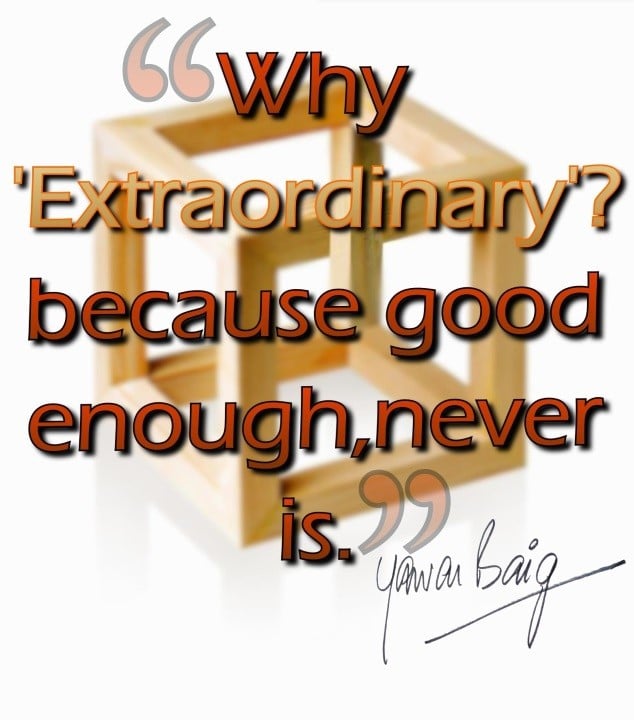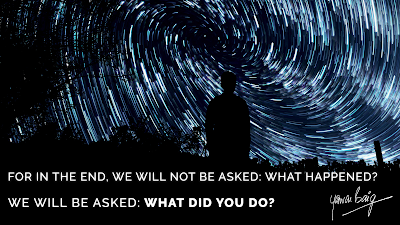
I am totally and completely committed to quality and I really don’t believe that there is an alternative.
As you work towards a great goal you will become restless, irritated, and impatient and inclined to take shortcuts and cut corners – all for the apparently excellent reason that you want to see the project up and started as soon as possible. But in this urgency, there will be the tendency to accept compromises. I am writing this to warn you of the biggest danger to success. The C word. Compromise. Because to compromise is to die a death without honor.
Those who have the courage to work for a great goal understand that ‘possible’ and ‘impossible’ are terms that define your own standpoint – how you see yourself – they point to who you are – not to the goal at all. Soaring at 30,000 feet is possible for an eagle or for a man with a flying machine. It is not possible or impossible in itself. All it needs is for you to ask, ‘How can I do it?’ Not, ‘Can it be done?’ Because ‘possible’ and ‘impossible’ are a factor of perspective. They depend on where you stand. Where you stand, defines the view you see. Change your position and the view changes.
Differentiation creates brand. Brand defines identity. Identity enables influence. Influence inspires followers and loyalty. Without differentiation you are a grain of rice in a sack.
Excellence is an expression of self-respect. So is mediocrity. We strive for excellence not because someone is watching or because we are playing to the gallery but because excellence is about us – how we see ourselves, what we think of ourselves, how we choose to define ourselves.
We define ourselves and the world accepts that definition and treats us accordingly. That is why Henry Ford famously said, ‘If you say that you can win or lose, I believe you.’ So, think before you define yourself. Every action defines me. Every word I speak, defines me. Every decision I take defines me. Everything I choose to do or not to do, defines me. It is my Brand Value. It is my character.
Excellence requires sustained heroic effort – often in the face of great discouragement. Only who revel in the effort can excel. The adrenaline drives them. Paradoxically they are goal focused but take pleasure in the difficulty of reaching that goal. For them the journey is the destination; because the excitement is only in the chase and ends with the catch. Mount Everest is a worthy goal to strive for because its dimensions are measured in height. The same distance on earth, 8 kilometers, on level ground wouldn’t be worth talking about. It is the difficulty of the ascent which adds value to the goal.
If you think success is difficult, try failure. To accept mediocrity is to accept failure at the start. Mediocrity ensures that your failure is permanent. That drug is called ‘compromise.’ I know that there are more mediocre people in the world than those who achieve excellence. But ask yourself who you would rather be – who would you like to emulate? Who do you choose as your role model?
In 1999 at the turn of the century people were running all kinds of surveys. One I read about was done by IBM to see what the percentage was of people who reach a level of excellence in their professions. They took the Olympic Gold Medal as the benchmark and asked, ‘How many people reach an Olympic Gold Medal level in their profession?’ They started with their own industry, Information Technology, and then expanded the survey to include a multitude of professions across the spectrum. They came up with the result that across the board, not more than 2% of people in any field or profession reach a level of excellence. 98% remain mediocre. That is the choice that one must make. You will have company in both places. The question is, which company do you prefer? Because the truth is that you take on the color of the company you keep. Who do you choose as your role model? Who do you choose to emulate? Choose wisely, because your choice will change you. That is why Tipu Sultan Shaheed said, ‘One day in the life of a tiger is worth more than a hundred years in the life of a jackal.’
Ask which life would you like to live – for in the end, both die.
Compromise is to attitude what cancer is to the body. The body doesn’t fight cancer but accepts it because it doesn’t recognize the threat. It accepts cancer cells until they kill it. Only those who hate mediocrity can excel. Not dislike, not be irritated by it, nothing mild. Only those who pathologically hate mediocrity, who can’t stomach it at any cost; those who are repelled and repulsed by it, find it disgusting, abhorrent and hateful and do anything to get out of it; can pursue excellence passionately. Compromise, like cancer, destroys from within. But unlike cancer it is infectious. One mediocre person who is willing to make compromises, will infect the whole team with mediocrity. To win, you need a totally uncompromising attitude towards quality. Without that your dreams will be stillborn. Guess what! What is the question that we need to ask when we are looking for mediocrity in our teams? That is question is not, ‘Which of them is mediocre?’ The question is, ‘Am I mediocre or not?’
Excellence takes effort. Few make it. Failure is painful. Nobody likes it. Mediocrity is the narcotic which makes destruction seem acceptable. So, people settle for less than what they can be. They get distracted by others and make excuses for their mediocre efforts as if that can change reality. It can’t. They imagine that if they can find others who agree with them, their mediocrity will be acceptable. It will be only to other mediocre people. But to those focused on excellence, who look not at others but at their own potential and beyond it, mediocrity is despicable, no matter what disguise it comes in. To tell you the truth, the mediocre ones also recognize this in the dead of the night, when they are alone with themselves, that their efforts don’t even begin to approach the boundaries of what could have been if only they had not compromised. Failure is not the enemy of excellence. Mediocrity is. Failure is painful and drives effort. Nobody willingly fails or remains in failure. But mediocrity is anesthetized failure. It is fatal because the victim does nothing to counter it because he can’t feel the pain.
I remind myself about a basic principle that I have always followed in my own life – It is better to fail trying to achieve an extraordinary goal, than to settle for a compromise. Why Extraordinary? Because good enough, never is. When you say, ‘Good enough’, you are looking at mediocrity. You are looking at cancer. Do to it what you would do to cancer. Cut it out. Or die. The choice is yours.
The important thing for us to remember is never to compromise. No matter how difficult it seems. Remember, when weighing in a balance, it is only the last few grains which tip the balance. Until then you don’t see any difference, any change in the level of the pans. That teaches us two fundamental laws:
- The balance will not tip until the last few grains fall into the pan.
- The last few grains will always tip the balance.
Both laws are equally true.
Remember that if we compromise for anything less than what we dreamed of, then in the evening of our days we too will be forced to look back on our lives and say, ‘If only I had not sold my dream so cheaply!!’ That is why I say that ‘If only’, is the most tragic phrase in any language. Because it means that the opportunity has passed, perhaps forever. All that remains is to shed bitter tears of regret. I remind myself and you that a door opens in the life of every man and woman where they have the opportunity to make a difference. Those who succeed are those who anticipated that opening and crossed the threshold.
I quote from MIT Technology Review: “Sabeer Bhatia arrived in the United States from Bangalore at 19; now he’s a Web gazillionaire. With friend and co-worker Jack Smith, Bhatia founded Hotmail, the first free Web-based e-mail service. This concept was a radical departure from the dial-up services that required a paid account. Hotmail, in contrast, could be accessed via a Web browser from any computer connected to the Net. The idea found a market niche. Make that a cavern: After two and a half years, Hotmail had 25 million active e-mail accounts; now there are more than 50 million. Venture capital firm Draper Fisher Jurvetson invested $300,000, and Hotmail launched on July 4, 1996. Just 18 months later, Microsoft bought the company for $400 million worth of Microsoft stock.”
In 1996 and earlier the opportunity to create a free, web-based email service was available to anyone in the world. Except that it was Sabeer Bhatia who went through that door.
Social change happens when a small group of dedicated people who believe in their system, their culture, their way of life, live it, practice it with confidence and differentiate on that basis. They live their way assertively, not aggressively but never compromise or change their system to suit the majority culture
To give you an example, the British colonized the world. They never wore turbans, shimaqs, egals, mishlahs, sherwanis or any of the gorgeous and beautiful clothing of Asia, Middle East, or Africa. So, the world started wearing pants, ties, and hats. That’s only one example. There are as many others as you have the curiosity to look for. The question is, ‘What do you want to do?’
The greatest damage to a cause is done by those who, perhaps in a well-meaning way, soften stances regarding principles. When that happens the clarity of differentiation is lost, and the message loses significance. There are two key things to learn in this context.
- How to disagree without being disagreeable. How to present your viewpoint in a way that is clear but not necessarily confrontative or belligerent. How to show people what is in it for them. Because that is the station that everyone listens to with great interest and it is called WiiFM – What’s in it For Me.
- To live with friction. To be comfortable with not being the most popular person on the block. Read the life of any great leader and without exception, you will find that they were very unpopular at least to start with. In many cases they remained unpopular with the masses. Yet they changed the world and are remembered with honor, centuries, even millennia after their passing. That is the choice we must make. Ask yourself, ‘What is the legacy that I want to leave behind?’
For a leader, the most critical thing is to understand that he must differentiate from the rest based on his message. If the leader compromises his message for the sake of popularity, material gain, followership, or anything else, the uniqueness of the message will be lost, and it will lose its value as a clear standard on which to model all actions. This is naturally not easy to do, as there are a lot of societal and other pressures to conform to existing norms, values, and customs. To stand out as different, especially when this means to go directly against the existing system is not easy. But it is an essential criterion that distinguishes the leader. For people to follow the leader, his identity, the goal that he is leading towards and what the followers will gain because of following that leader, must all be clear, unambiguous, and inspiring. A flag is a symbol but only when it is flying high. Not when it is drying on a clothesline.
In conclusion, I want to say to you that it is critical for the leader not to be seduced with the promise of followership and never to change, dilute or modify the message to suit anyone in the desire to get converts. The message distinguishes the leader. If he compromises that message, then he has lost everything. This is the biggest argument in favor of differentiation and against assimilation and losing one’s identity, that I can place before you. Someone who does not have the confidence to differentiate and is content with being one sheep in a flock is completely unfit to be a leader. Being a leader means to take hard decisions and getting used to being lonely.
Remember, the tiger walks alone. Sheep have lots of company.


Beautifully articulated and explained. Certain things like ethics , morals and ideals cannot be compromised without seriously damaging a person’s self worth, belief in oneself and confidence. In business this means quality, business ethics and commitment.
However, I differentiate between sacrifice and compromise. A parent compromising on a holiday or purchase of an car, so that the child gets better education, is in no way demeaning himself. In fact it adds to the character.